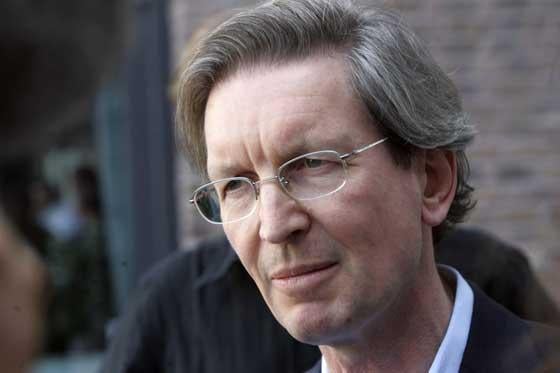
Former Mirror boss David Montgomery’s plans to impose the ‘British model’ of regional newspaper publishing on Europe have provoked much suspicion.
Heard the one about the Ulster Unionist who tried to buy up half the local newspapers in Europe?
When he sounds like an Irishman, he’s tolerable. But when he starts talking about the British Model of Newspaper Publishing, everyone hates him.
Last summer, when David Montgomery’s Mecom acquired a substantial portion of Norway’s newspaper industry, union representative Kjetil Haanes bleakly satirised the former Mirror boss as a ‘a nice guy from Nor – thern Ireland who plays the piano”.
Typically, Montgomery’s promise to impose the British Model on Europe’s regional newspapers provokes far more aggressive responses.
During the past year, amid a blizzard of deals, Montgomery has assembled a company that’s on course to employ 11,000 and generate revenues of £1.2bn: about the same as Trinity Mir ror or Daily Mail and General Trust.
The numbers might be impressive. But everywhere in Europe, Monty has been confronted by suspicious politicians, indignant editors and concerned readers.
In Germany, the editor of a newspaper acquired by Mecom published a picture of his new boss, upside down – accompanied by the caption ‘Nein”.
In Norway, the culture minister suggested that legislation might help Mecom to remember its ‘civic responsibilities”.
Like it or not, you’ll be hearing more about Monty in the coming months, as Mecom leaves behind its membership on London’s Alternative Investment Market for a full listing on the London Stock Exchange.
As the chief executive of a mainstream listed company, Montgomery will return to the radar screens of media editors for the first time since his exit from the Mirror in 1999.
Two factors in particular have opened the way for this spectacular return to prominence.
The first is a pent-up demand for consolidation on mainland Europe.
Across the continent, paternalistic media owners want out of newsprint. Some lack the nerve and scale needed to knock underperforming papers into shape. Others are concerned about the impact of the web.
In several cases, Mecom has become a preferred bidder because local rivals are hobbled by restrictive media ownership laws.
The second is hot money. Lots of it. British newspapers have become a poor investment for the Londonbased fund managers who invest our pensions and savings. Revenues are becalmed or declining. Costs have largely been cut to the bone. And the internet looms as a constant threat.
Despite this, investing in British newspapers remains costly. When Northcliffe sold Aberdeen Journals in 2006, for example, it extracted a price that was three times the unit’s revenues.
In mainland Europe, regional newspapers sell for slightly more than one times revenues; a relative bargain.
For Montgomery, European regionals have an added attraction: they’re frequently sold on a subscription rather than news-stand basis.
Accordingly, Mecom has plans to sell wine, holidays and financial services to its 1.4 million subscribers across Europe – an innovation that fills conservative journalists in places such as Norway with dread.
These were the opportunities that Montgomery outlined to the City’s biggest fund managers in 2005 when he first invited them to accompany him into mainland Europe.
The response was eager. In the past two years, City investors have spent £850m on buying shares in Mecom. Montgomery has been spending this capital as rapidly as it came through the door – and sometimes even faster.
The outlines of the British Model are predictable: cut costs, boost revenues and boost operating profit margins towards 15 per cent.
In other words, Mecom plans to do to the European newspaper industry what Murdoch and others did in Britain in the Eighties and Nineties.
Across Europe, editors are starting to take Montgomery – and Mecom – very seriously indeed. For the most part, they don’t like what they see.
In the wake of its buying spree, Mecom has announced plans to make 750 staff redundant across Europe. Most of the redundancies, Mecom insists, will hit administrative, rather than editorial, roles.
Suspicion runs so deep that Mecom’s employees across Europe have set up a formal network to swap information on their new master.
Olav Skjegstad, one of the attendees at the group’s first meeting, told Norwegian blogger/journalist Kristine Lowe: ‘We expect very turbulent times ahead… What happens in one country might happen in others.”
Many Mecom journalists doubt Mecom’s promises of investment. They don’t like the speed with which the company is acquiring newspapers. And they are concerned by Montgomery’s suggestion that editors need to be ‘involved’in the commercial side of publishing.
There are worries about political interference, too. In Poland, where Mecom picked up a 50.1 per cent stake in the broadsheet Rzeczpospolita, the company is alleged to have intervened to tone down the paper’s criticism of the government.
In Norway, Lowe accused Montgomery of ‘subtly shifting the focus of the discussion in that ever-so- British way”. His performance, she suggested, showed why Norwegians typically regard the British as being ‘full of balderdash”.
And then there’s the question of salaries. According to The Independent, the average wages of Mecom employees are 78,000 euros (£54,000) in Denmark, 73,000 euros (£49,000) in Norway and 65,000 euros (£44,000) in Germany. And these are average salaries for all staff.
Montgomery freely admits that European regional journalists are paid far better than their UK counterparts.
But if Mecom’s plans to sell holidays and wine don’t succeed, the implications for staff could be grim.
Old Europe’s combination of decent salaries, editorial integrity and benign proprietors sounds remarkable to British ears. We might think of it as a dreamy utopia. Or a nightmarish recipe for inertia and sclerosis. On the mainland, they proudly regard it as the natural order.
What’s certain is that Montgomery’s British Model is designed to put an end to it.
Email pged@pressgazette.co.uk to point out mistakes, provide story tips or send in a letter for publication on our "Letters Page" blog
